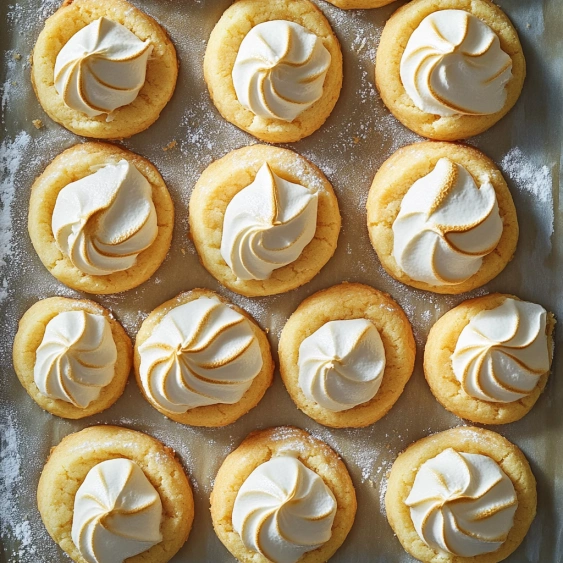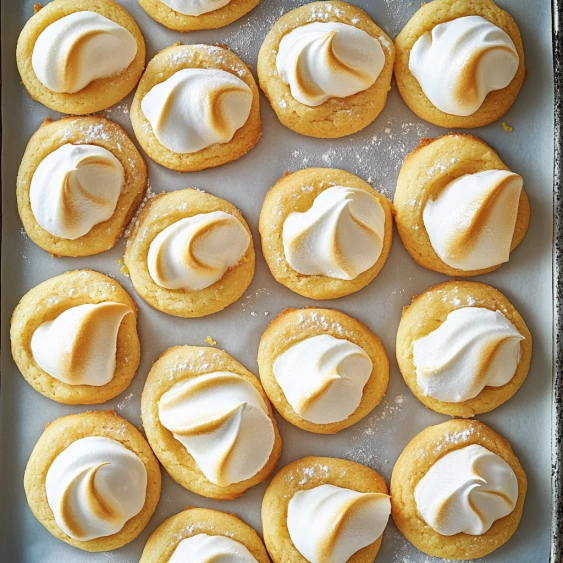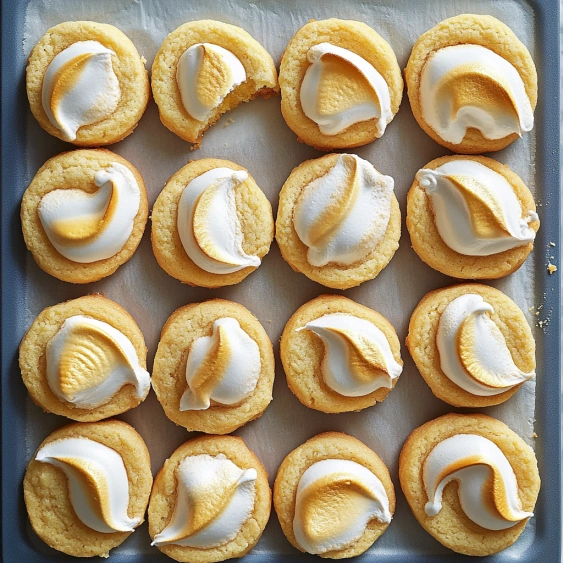 Pin it
Pin it
This lemon meringue cookie recipe transforms the beloved pie flavors into a delightful handheld treat. The buttery lemon cookie base pairs perfectly with the light, toasted meringue topping for a dessert that's both elegant and approachable.
I discovered this recipe when planning a spring tea party and needed something special but not overly complicated. The look on my guests' faces when I brought out these beauties was worth every minute of preparation.
Ingredients
- Granulated sugar: Provides the perfect level of sweetness while helping create the cookie's tender texture
- Fresh lemon zest and juice: Deliver bright, authentic citrus flavor without any artificial taste
- Room temperature butter: Ensures proper creaming which creates the ideal cookie structure
- Egg whites: Form the base of the meringue topping giving these cookies their signature look
- Cream of tartar: Stabilizes the meringue preventing it from weeping or collapsing
- Lemon oil (optional): Intensifies the citrus flavor dramatically
- All-purpose flour: Gives the cookies structure while maintaining tenderness
Step-by-Step Instructions
- Infuse the sugar:
- Combine lemon zest with granulated sugar and rub together with your fingertips until the sugar becomes moist and fragrant. This releases the essential oils from the zest, distributing intense lemon flavor throughout the dough that simple mixing cannot achieve.
- Cream the butter and sugar:
- Beat the butter and lemon sugar for a full five minutes until the mixture becomes noticeably lighter in both color and texture. This incorporates air into the dough creating a tender cookie that spreads perfectly during baking.
- Add wet ingredients:
- Incorporate the egg completely before adding acidic ingredients like lemon juice. The vanilla adds depth while the optional lemon oil amplifies the citrus notes. Make sure to scrape down the bowl thoroughly to ensure even mixing.
- Add dry ingredients:
- Mix flour, baking powder and salt just until combined. Overmixing at this stage develops gluten which can make cookies tough. The dough should be soft but not sticky when properly mixed.
- Shape and bake:
- Use a cookie scoop for uniform cookies that will bake evenly. The staggered arrangement on the baking sheet ensures proper air circulation. Look for just a hint of golden brown around the edges as overbaking will diminish the lemon flavor.
- Prepare the meringue:
- Heat the egg white mixture to 160°F to ensure food safety while creating a stable meringue. Continuous whisking prevents the eggs from cooking and creates small, even air bubbles for a silky smooth topping.
- Apply and toast the meringue:
- Work quickly when topping cookies as meringue becomes more difficult to spread as it sets. The kitchen torch creates beautiful caramelization without heating the entire cookie. Keep the flame moving to prevent burning.
 Pin it
Pin it
When I first attempted this recipe, I skipped the step of rubbing the zest into the sugar and noticed a significant difference in flavor. That simple extra minute of preparation transformed the cookies from good to extraordinary. My daughter now requests these for every special occasion.
Storage Solutions
These cookies offer excellent flexibility for make ahead preparation. The baked cookies without meringue can be stored in an airtight container at room temperature for up to three days with no loss of quality. For longer storage, freeze the plain cookies for up to three months. Unfortunately, once topped with meringue, the cookies are best enjoyed within 8 hours as the meringue will gradually soften and lose its texture. For the freshest presentation, consider baking the cookies in advance and adding the meringue topping shortly before serving.
Perfect Pairings
These lemon meringue cookies shine when served alongside the right beverages. Their bright citrus flavor pairs beautifully with Earl Grey or chamomile tea for an afternoon treat. For a more indulgent dessert presentation, serve with prosecco or champagne where the bubbles complement the light meringue topping. If serving as part of a dessert spread, balance their sweetness with fresh berries or a small scoop of raspberry sorbet to create a complete dessert experience that highlights the lemon flavor.
Troubleshooting Tips
Achieving the perfect meringue can be challenging for beginners. If your meringue refuses to form stiff peaks, the most likely culprit is fat contamination. Ensure your mixing bowl and beaters are completely clean and free from any grease. Even a tiny amount of egg yolk can prevent proper whipping. Another common issue is cookies spreading too much during baking. This typically happens when butter is too warm or flour is undermeasured. Refrigerating the shaped cookie dough for 15 minutes before baking can help maintain their shape in the oven.
 Pin it
Pin it
Frequently Asked Questions
- → Can I make these cookies ahead of time?
Yes, the cookie bases can be made up to three days ahead and stored in an airtight container. However, the meringue topping should be added just before serving (within 8 hours) for the best texture and appearance.
- → What can I substitute for lemon oil?
If you don't have lemon oil, you can simply omit it or add an additional 1/2 teaspoon of lemon zest for more citrus flavor. The cookies will still have plenty of lemon flavor from the zest and juice.
- → Do I need a kitchen torch for this?
A kitchen torch is ideal for toasting the meringue, but you can use a broiler as an alternative. Place the meringue-topped cookies under a broiler set to high for 30-60 seconds, watching carefully to prevent burning.
- → Why do the cookies need to be eaten within 8 hours?
Once topped with meringue, the cookies begin to soften as moisture from the meringue transfers to the cookie. For the best contrast between crisp cookie and fluffy meringue, enjoy them within the recommended timeframe.
- → Can I use bottled lemon juice instead of fresh?
Fresh lemon juice provides the best flavor, but bottled lemon juice can work in a pinch. Since you need lemon zest anyway, it's worth using fresh lemons for both the zest and juice.
- → What's the purpose of heating the meringue mixture?
Heating the egg white mixture to 160°F creates a more stable meringue by dissolving the sugar completely and pasteurizing the egg whites, which makes them safer to consume and less likely to weep or deflate.
